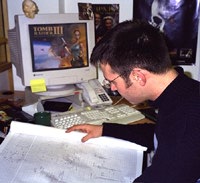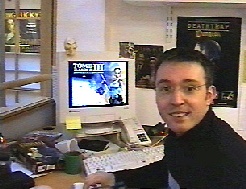Career interview: Games developer

Andrew Wensley, Eidos Game Producer
Andrew Wensley works at Eidos Interactive, the company who publish the mega-successful computer game Tomb Raider III: Adventures of Lara Croft.
Andrew, 26, started at Eidos three years ago. He was initially employed as a game designer, quickly moving on to become lead game designer on the popular game Deathtrap Dungeon. Now he works as a game producer, spending a good proportion of each month in Norway liaising with a game design company that is producing a new opus for Eidos.
While always having been a great fan of computer games, Andrew's academic background is in maths. PASS Maths caught up with him at Eidos's Wimbledon offices.
Academic history
From first form to GCSE, Andrew attended Whitecross Comprehensive in the Forest of Dean. For his A Levels he moved to the Royal Forest of Dean College, a sixth-form college, where he took Maths, Physics and Economics (and a Performing Arts course on the side!). He then went on to Imperial College at the University of London, where he took a three-year B.Sc. in General Maths.
Andrew says that he didn't make much use of the Careers Service at his secondary schools. "From the age of 14, I knew I wanted to do a maths degree", he says. "I always enjoyed maths, and I believed that someone with a maths degree could go in a lot of different career directions. What employers want is analytical skills, the ability to think. In most cases, they don't care whether or not you can solve ordinary differential equations - they're looking for problem solving ability, the ability to do a thorough investigation. You get all of this from a maths degree".
Student life
Andrew had a busy time as a student. In his first year he was Hall Representative at his student residence and joined the Paintballing Club, of which he was Club Treasurer in his second year. He spent a year as the Maths Department Student Representative, and was involved in the Student Union all the way through his degree, culminating in taking a sabbatical year post-degree to be the Student Union President. "I think the purpose of University is to broaden your education, not just to train for a job", he says.
Of course, there was another activity that was important to Andrew as a student - playing computer games! He's been a dedicated gamer since he got his first computer (a ZX-80) at the age of eight, and says that, for him, "computers were always about playing games. Even at University! Once a game gets you, it's hard to get away." His addiction to games has been a mixed blessing. It didn't help his studies much: as he ruefully admits, "I might have got a better degree if I hadn't spent so much time playing games!". However, it has proved important in his job at Eidos: "to work in this industry, you need to understand games - you need to live, breathe and sweat games!"
Finding a career

Eidos's offices in Wimbledon
When Andrew finished his degree, he says he "didn't have a clue" what he wanted to do. He interviewed for jobs in traditional maths-related areas like accounting, but says that "they could tell I wasn't keen". Before starting at Eidos, he spent a year in "filler" jobs, including various data-entry placements and six months as a forklift driver.
During this period, he also took on some work as a part-time Maths tutor, working with A-Level students. "It was fun - problems, problems, problems. As far as Maths exams go, it's a case of spot the problem and pick the tool. You just need to have done enough example problems to be able to spot them."
Andrew says it would never have occurred to him to try to join the games industry, because he didn't have a Computer Science background - "I wasn't confident about programming. I'd only studied Fortran at University, and I didn't know C or C++". In fact, the idea to apply to Eidos came from a friend who was working in another games industry company. After much encouragement, Andrew sent his CV to a number of games companies, and within a few weeks had been interviewed and had two job offers, including Eidos!
Working life
The working day of a games development team changes with time, because games have a "development cycle". Andrew says that early on, there is a lot of brainstorming to come up with a detailed concept for the game. The ideas then need to be either fitted to existing technology or new technology needs to be developed, and a demonstration produced. If the company wishes to go ahead with the prototype game, actual production can then begin. "Production of the game will typically be an 18 month project involving 10-20 people and a lot of teamwork. The last phase is exhaustively testing the game to make sure everything is working as you intended".

Andrew hard at work designing a game level
A game designer isn't usually occupied with low-level games programming, so Andrew's lack of technical programming experience wasn't a problem: in fact, he describes game design as "a black art" rather than a science! "The designer is responsible for game-play decisions: how does that monster act? What's the overall concept of the game? For example, you might decide that a particular monster is too reactive, and ask a programmer to turn down its hearing by a third to change its behaviour".
Helping to figure out what's going wrong when a tester finds a bug is another important responsibility. "It's like being given a plate of spaghetti and being told one strand is wrong. Which one is it? You have to pull on all the ends to find out". Andrew says that "the crunch happens at testing. Errors are always there, and you have to find them and fix them. Maths problem-solving skills, including thoroughness and logical reasoning, are particularly useful here".
Work perks
Andrew thinks that working conditions in the software industry in general are pretty good. "There are benefits like company sponsored health schemes, gym membership, stock options and performance-related bonuses. It's also fairly easy to move around - to go to the US, for example".
He likes the informal atmosphere at Eidos - jeans and t-shirts are the developers' uniform! - and enjoys the fact that he's "working with interesting people". He also appreciates "seeing games before they're released, and making a game that you want to play". A particular concern in the software industry is hand and arm damage from long hours of computer use; another perk is that Eidos tackle this issue by providing on-site shiatsu hand and arm massage for employees!
The games industry is dominated by younger people, and Eidos is no exception. "Our game testers range from 16 to 27, and most of our developers are in their twenties", says Andrew. What about gender balance? "Overall, the company is about 50/50, but games development is still pretty male-dominated. This is changing though!" Lara Croft would approve.
Typical salary? Andrew says this depends very much on the company and the individual concerned. A "low starting salary" for somebody straight out of higher education might be 15,000 p/a, but this could be expected to rise "by 50% or 100% or more in two to three years".
Recreation

Still a keen games fan!
At times, Andrew's job can keep him pretty busy. During "quiet" periods he'll work from 10am until 6pm, but when things are hectic 14-hour days aren't uncommon. "When I have the time, I like to play rugby and badminton and go running. Also, I'm currently taking a course in shiatsu massage." Of course, he still lists one of his hobbies as "playing computer games!"
Future directions
So what are Andrew's career goals for the future? "Total World Domination by 2020 - every game player's dream!", he grins. Actually, there are many directions Andrew could choose to follow, especially in an industry that has to change as the underlying technology develops. "There's no traditional career structure in the games industry," he says. "At the moment I'm doing more management, so I might want to pursue that, or I might want to move back into game development. Sometimes people decide to start their own games company. I'm in a strong, fluid position - there's lots of ways I could go."
Word to the wise
So, what would Andrew say to somebody contemplating taking a Maths degree? "Do it!" he says with a big grin. "Enjoy! Find out the bits you like and don't like, and chase the bits you like. You never know where you'll end up!"